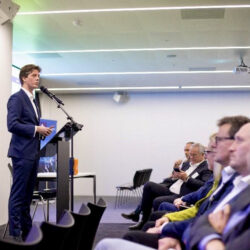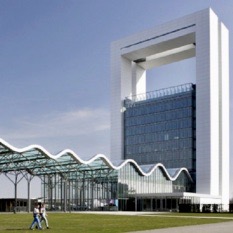BISCI: Joining forces for circularity

The fact that achieving a circular society is primarily a matter of joining forces was underlined during the event ‘Dare to be circular’. This event, organized by the Brightlands Institute for Supply Chain Innovation (BISCI) at MECC Maastricht on 2 March, was the culmination of three years of research and knowledge sharing within the BISCI network. Co-funded by the Province of Limburg, BISCI is a collaborative partnership between Maastricht University, TNO and the Technology & Logistics Institute of Fontys University of Applied Sciences.
Elsa Scholte, Global Communication Director of Solidaridad, highlighted the Fair & Smart Data project during the event. Within this project, BISCI and Solidaridad analyse data from coffee supply chains in order to make these chains fairer. Solidaridad’s Fair Trade initiatives ensure that small farms in Africa get paid a fair price for their coffee beans, plus farmers are rewarded for providing harvest data.
“There are only a handful of major buyers of coffee beans in the world, such as Lavazza, Peets, Nescafé, JDE and Starbucks. They shoulder an important part of the responsibility for fair prices to coffee farmers,” Scholte said. According to her, the average price per pound of coffee beans has remained the same for the past 30 years: $1.08. “Yet in the meantime, everything has become more expensive for the coffee farmers too.”
In a similar context, Jelmer van de Mortel (pictured) presented Rabobank’s circular economy vision and action in relation to another initiative, called Acorn. In the Acorn project, the Solidaridad Network, Rabobank and Microsoft have joined forces to capture data in global supply chains as the basis for fair prices to smallholder farmers.
Plant-based plastic
The company Avantium develops innovative solutions for the chemical industry. For example, it has developed an entirely plant-based plastic alternative called FDCA. This is a sugar-based raw material used to make PEF, a 100% plant-based bioplastic that is used for bottles, packaging, films, fibres and textiles, among other things. This production of this type of plastic generates zero emissions and it can be infinitely reused.
Tom van Aken, CEO and founder of Avantium, clearly sees great opportunities for his scale-up and believes in a future based on circular materials. He explained that a facility is currently being built in the Dutch town of Delfzijl where Avantium will produce 5 kilotons of FDCA annually. In addition, the company will sell licences to large plastics manufacturers who can use Avantium’s technology to produce bioplastics themselves.
According to Van Aken, the production of plant-based plastic packaging is aimed more at keeping it in the recycling system, rather than enabling it to be disposed of in the environment. “But if it does end up in the environment accidentally, it won’t pose the problems of traditional plastic.” He also stated that Avantium is now working on a licensing model for its factories so it can scale up globally. “The first contract has already been signed in the USA.”
Decisive decade
Another speaker at the event, Martijn Stamm, Director Mobility at TNO, talked about the Green Deal and EU targets for reducing emissions. He said that we are living in a decisive decade. To combat climate warming, we need to reduce harmful greenhouse gases – both in Europe and worldwide – by as much as 90% by 2050.
Stamm applauded the creation of ecosystems such as BISCI which facilitate intensive supply chain collaboration, including with suppliers and customers, to make the entire supply chain sustainable and reduce Scope 3 emissions. After all, these account for up to 75% of a product’s total emissions. “For the Green Deal to succeed, we need to set common goals, work to create a green environment and step out of our comfort zone,” Stamm said.
When wrapping up the proceedings, Professor Dominik Mahr from Maastricht University looked back on an engaging day of insightful keynotes, knowledge sharing, in-depth breakouts and interesting quizzes. According to him, the key lesson of the day was the importance of engaging one another with the ‘when, why and who’ of the sustainability story. “Moreover, rising to the challenge together can be very rewarding and produce great results,” Mahr said.










